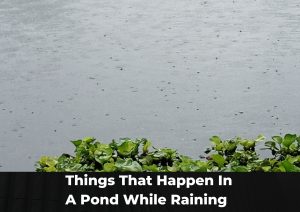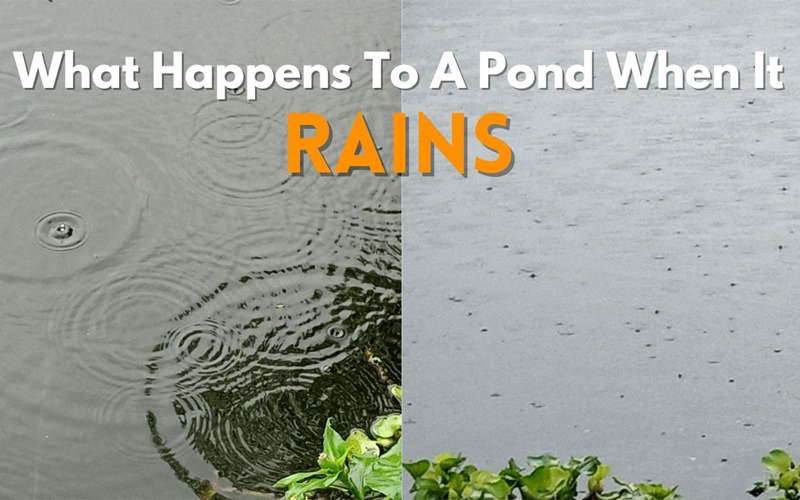When it rains, standing by the pond is one of the most beautiful sights to see. Because with each drop of rain small movement is created in the pond water. What we enjoy watching from outside, are aquatic animals also enjoy.
But when it rains, there are many changes in the pond, which we may not be able to perceive with our eyes. But if you have an idea about the pond and live with the pond for a long time, then you will be able to catch the changes in the pond after rain.
But if your house is not on the side of the pond or you have no idea about the pond then how to understand the changes in the pond during rains? Don’t worry, here we will tell you what happens to a pond when it rains.
Things That Happen In A Pond While Raining

Me, my family, our ancestors have been farming fish in the pond for a long time, and our house is right next to that pond. And this pond is very big in area and the water is clear, it is the largest pond in our municipality.
So in our long experience, we have noticed some issues in ponds which are related to rain. When it rains, the changes that occur outside and inside the pond can generally be described in 6 parts. So let’s see:
1. Increased Water Level
The visual and primary effect of rain on a pond that everyone can notice is an increase in its water level. Yes, rainfall replenishes the water in the pond and causes it to rise. But how much the water of a pond will increase depends on the amount and intensity of the rain.
Suppose, if I talk about our family pond which is huge in size and increased by 1 meter for the last 15 days of rain. But with the intensity of rain, the rising of the water level can change. But will my pond overflow in heavy rain?
Yes, our pond has overflowed multiple times in the past several years, but this problem is temporary. But when it happens we have to cover the lower sides of our ponds with nets to protect our fish from going out from the pond. And this is how you can also protect your fish during overflow.
2. Runoff
Runoff plays an important role for aquatic animals because rainwater that falls on the surrounding land will typically flow into the pond as runoff.
Whether it is rain or heavy rain, runoff carries sediment, organic matter, and nutrients from the land into the pond. But the composition of the runoff can vary depending on the land that is available besides the pond.
Sometimes, it can create bad effects on the ponds and aquatic animals, especially for fishes. Because the land which is available near your pond if they agricultural land if the farmers use heavy chemicals on them.
Because during rain, rainwater carries chemicals also with other compounds which can cause death for your fish. And that’s why sometimes we can see dead fish in ponds after rain.
By the way, this is not only the reason why fish dead after rain. This is only one reason, and there are multiple reasons why fish can die after rain. Our next article will be about this topic, to stay connected with us.
3. Dilution
Dilution is another good side that happens in ponds after rain. Because, if your pond water has become stagnant or concentrated with pollutants, rain, and rainwater can help dilute and refresh your pond.
Yes, the incoming rainwater mixes with the existing water and overall improves the quality of your pond water. But the opposite thing can happen if the rainwater is too much acidic or if there is acid rain happen on your area.
4. Oxygenation

Oxygenation is a way that we can’t see with our eyes because it happens inside the pond after rain. Rainfall helps to oxygenate the pond, and this is the natural way. Although, during summer we use air pumps to ensure the right oxygen level for our fish.
So if your pond oxygen level is low, and if you notice that your fish and other aquatic animals are dying then you can use an air pump to keep the pond ecosystem and oxygen level stable.
But in the rainy season, rain works naturally to oxygenate the pond. When raindrops fall onto the water’s surface, they cause agitation and create ripples. And this process continuously enhances the exchange of gases. And allow oxygen from the atmosphere to dissolve into the water.
5. Nutrient Input
Rainwater contains nitrogen and phosphorus which are known as dissolved nutrients. And these dissolved nutrients are essential for plant growth.
During rain when rainwater enters a pond, it introduces these nutrients which support the growth of aquatic plants and algae. But remember excessive nutrient input can lead to algal blooms and create an imbalance in the pond ecosystem.
6. Erosion And Sedimentation
Excessive and heavy rains can carry too much soil from the land around the pond and fill the bottom of the pond. And if this is the case for a long time, the depth of the pond will decrease and silt will accumulate at the bottom of the pond.
Also, during periods of erosion and heavy rains, pond water becomes turbid, which can pose a threat to aquatic life.
The 6 major changes shown here are directly related to rainfall and are also related to pond ecosystems and aquatic animals and plants. But keep in mind these 6 major changes vary depending on the pond size, location, depth, existing water quality, and the intensity and duration of the rainfall.
So, hope it’s clear to you what happens to a pond when it rains. If you have other pond and fish farming-related questions, then ask us in the comment box. And to get every update about ponds and fish farming on ponds stay connected with us.




